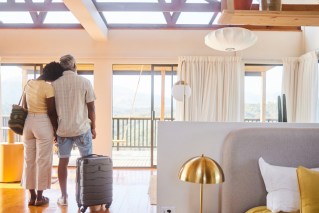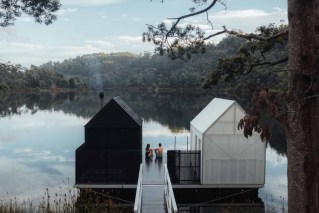What you need to know about being an Airbnb host


Airbnb releases the money after 24 hours.
Heard of Airbnb? The accommodation site was established in 2008 after two of its co-founders decided to rent out a few airbeds in their San Francisco loft during a design conference.
It has now grown into a mammoth web of rooms across 190 countries. Since Airbnb’s inception, 20 million guests have stayed in more than 800,000 listings across the world.
• A version of this article first appeared in Hey Little Spender
• Ten ways to visit Los Angeles on a shoestring
• Fighting the Airbnb guest who won’t leave or pay
So if you’re a traveller by nature – or just think you’d enjoy welcoming an assortment of interesting characters through your front door – how can you go about getting a slice of the Airbnb pie?
What is Airbnb?

Log on to see rooms across 190 countries.
For the uninitiated, Airbnb is a worldwide online community that allows people with a spare room (or those with an entire house) to connect with guests looking to rent short-term accommodation.
It’s free to list your property, with Airbnb making its money by taking three per cent of the price you’re charging per night. Your guest also pays a service fee on top of that which goes direct to Airbnb.
The legalities
Do some research first to make sure hosting is legal in your city. If you’re renting, you’ll also need to check the regulations and your rental contract. If you own or are renting an apartment in a large complex, you may also need to check with your body corporate. Read here for more details on considering insurance and security factors.
How to list your property

You’ll need somewhere for your guest to sleep.
First, you’ll need somewhere for your guest to sleep. If you don’t already have a bed, why not find one on eBay, or through friends? A second-hand mattress that may have barely been used might be another good option, while new pillows, doonas and sheets can all be found at reasonable prices if you look hard enough. Will you need an extra heater, new towels?
Once the room is set up, complete a thorough and welcoming listing, detailing any pluses and potential pitfalls of your property, amenities nearby and house rules. Do you have wireless internet, will you provide breakfast? Are visitors allowed? You’ll also need great photos. In some cities, Airbnb provides a free professional photography service.
Don’t forget to plug as many ‘verifications’ into your profile as possible, such as your Facebook profile, LinkedIn page, passport and driver’s licence (they won’t be visible to guests). Include a clear photo and a description of what you’re all about to make potential guests feel more secure. They should do the same.
Setting a price

The more you charge, the more people expect.
Take a look at other similar properties in your area at a similar standard. For starters, set the price a little lower to get your first good reviews, which will help you attract more guests in the future if you decide Airbnb is for you.
Don’t forget, the more you charge, the more people are likely to expect of you.
How much could you earn?
Airbnb’s ANZ Country Manager, Sam McDonagh, says that the vast majority of Airbnb hosts rent out the property in which they live.
In a study in late 2013, Airbnb found that about 85 per cent of their hosts in Sydney rented out their primary residence. On average they rented their home or room out for 37 nights a year, earning just over $4500.
Taking bookings

Choose the days on your calendar that you are available to host.
Once that’s all up and running, choose the days on your calendar that you are available to host. If you’re living there too, think about how long you’re happy to share your home for. On paper, a month’s worth of potential Airbnb earnings might look good, but don’t forget you’ll probably have to share your living space (and depending on your set-up, the bathroom).
The beauty of Airbnb is that you don’t have to accept any guest you think you might not get along or feel comfortable with, and you can stop doing it when you get sick of it.
Don’t be afraid of asking potential guests for more information about themselves if you are not sure – especially if they don’t already have reviews on their profile.
It also pays to print off a welcome sheet for guests, so they know how to work your TV, washing machine, access your wifi or contact you in an emergency.
Show me the money

Airbnb releases the money after 24 hours.
Airbnb releases the money to hosts about 24 hours after the guest arrives. If you choose to be paid through PayPal, it can take a few hours after that, and a direct deposit into your account will likely take another couple of days.
A personal experience
I’ve found Airbnb to be a great way of being able to afford to live by myself in a nice apartment while having a bit of interesting company, and some extra spending money from time to time. It also inspires me to keep my place immaculate while a guest is here.
The first time I hosted I felt quite excited, but a little nervous. Having set up the spare bedroom and bought a little heater, I visited a tourist information centre in the CBD and gathered a bunch of information on bars, tourist attractions and restaurants, including maps of the city and tram timetables.
I also set up wireless internet, bought a spare public transport card and some chocolates to pop on the spare bed as a welcome. Then I stocked up on basic breakfast provisions and made sure everything was squeaky clean.

Including details such as breakfast makes a big difference.
My first guest was a professor who was commuting from about five hours away and needed a place to crash for two nights. I was unsure about having a guy I didn’t know staying with me, and whether it would feel too awkward.
His profile didn’t include a lot of information, so I asked him for some more, which he was very happy to provide. With that, I used the power of Google to find a work video of him which set any nerves at ease.
He was an interesting, intelligent family guy and I found the experience right up my alley.
I’ve since hosted a Kiwi moving to Melbourne to settle (after years in London), an IT professional from regional Victoria, a man who arrived ahead of his Swedish family to secure a job and a house for them, a good-humoured writer, a friendly lady visiting Melbourne for a massive Jehovah’s Witness convention and an Italian girl looking for a job.
There have been a few awkward moments (such as having to answer the doorbell in a towel when a guest arrived mid-shower), interesting conversations and a lot of laughs.

Open up your home for a fee.
To ease the – as yet unfounded – concerns of friends and family, I now only accept female guests, but may change my policy on that down the track.
I also don’t usually accept people for longer than a week, unless we get along well and they ask to extend their stay. I often also block out my calendar between guests so I can have some time to myself.
Mostly I’ve learnt to decline booking requests from anyone who sets off alarm bells, ask for more information if needed and then roll with it.
A version of this article first appeared in Hey Little Spender.








